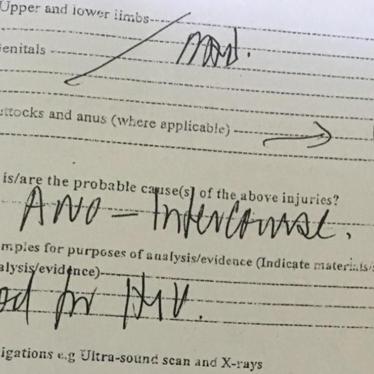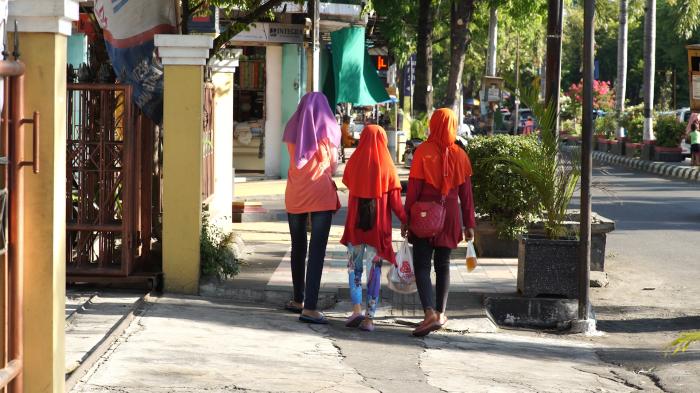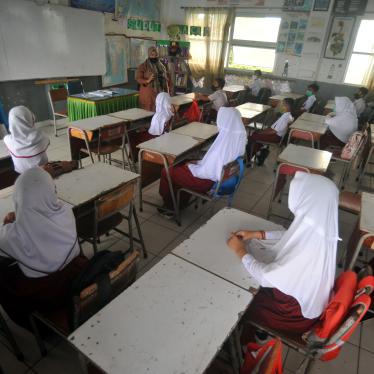(Jakarta) – Dress codes for women and girls in Indonesia discriminate against students, civil servants, and visitors to government offices and should be revoked, Human Rights Watch said in a report released today. The government should fully enforce a February 2021 decree that bans abusive dress codes for female students and teachers in Indonesia’s state schools, and take additional legal steps to end discrimination against women and girls.
The 98-page report, “‘I Wanted to Run Away’: Abusive Dress Codes for Women and Girls in Indonesia,” documents government regulations that require girls and women to wear the jilbab, Muslim apparel that covers the head, neck, and chest. Human Rights Watch describes the historical imposition of discriminatory regulations on clothing, and the widespread bullying to wear a jilbab that causes women and girls psychological distress. Girls who don’t comply have been forced to leave school or have withdrawn under pressure, while female civil servants have lost their jobs or resigned to escape constant demands to conform.
“Indonesian regulations and policies have long forced discriminatory dress codes on women and girls in schools and government offices that violate their right to freedom from coercion to adopt a religious belief,” said Elaine Pearson, Australia director at Human Rights Watch. “Indonesia’s national, provincial, and local governments should immediately end these discriminatory practices and let women and girls wear what they choose without sacrificing their right to education or work.”
After a complaint from the father of a secondary school student in Padang, West Sumatra, went viral on social media, Education and Culture Minister Nadiem Makarim, Home Affairs Minister Tito Karnavian, and Religious Affairs Minister Yaqut Cholil Qoumas signed a decree on February 3 that allows any student or teacher to choose what to wear in school, with or without “religious attributes.” Makarim said that state schools had “misinterpreted” a 2014 regulation on uniforms. Qoumas said that the Padang case was just “the tip of the iceberg,” and that the mandatory jilbab regulation has been used “to discriminate, to intimidate and to pressure schoolgirls.”
Human Rights Watch documented many cases in which Christian and other non-Muslim students and teachers were also forced to wear the jilbab, which is usually combined with a long skirt and a long sleeve shirt. In English, the head covering is better known as a hijab.
Since 2001, local authorities have issued more than 60 local and provincial ordinances to enforce what they claimed to be “Islamic clothing for Muslim girls and women.” Most of Indonesia’s almost 300,000 state schools (sekolah negeri), particularly in the 24 Muslim-majority provinces, require Muslim girls to wear the jilbab beginning in primary school.
“Whenever it is religion class, and whenever her teacher runs into her, he would ask why she’s not in jilbab,” a mother of a high school student in Yogyakarta told Human Rights Watch. “He would even ask, ‘Will you wear it tomorrow?’ My daughter would just say ‘Yes, okay.’ But as soon as she comes home, she shares with me her discomfort, ‘Why are they like that, Mom?’”
In 2014, the Ministry of Education and Culture issued a national state school uniform in which a drawing depicts “Muslim clothing” with a long skirt, a long sleeve shirt, and a jilbab, suggesting it was the only option for Muslim girls. This prompted provincial and local education offices to introduce new rules, which in turn induced thousands of state schools, from primary to high school, to rewrite their school uniform policies to require the jilbab for Muslim girls.
Mohammad Nuh, the education minister who signed the 2014 regulation, told Human Rights Watch in an interview for the report that the regulation provides two uniform choices: a long sleeve shirt, long skirt, and jilbab; or the uniform without the jilbab. He said, “I wrote that regulation. But it is not mandatory.” He stressed that any Muslim girl should be able to choose whether to wear a jilbab. Yet even when school officials have acknowledged that the national regulation does not legally require a jilbab, the existence of the regulation has allowed schools to pressure girls to wear one.
Under the new decree, local governments and school principals were required to revoke any mandatory jilbab regulations by March 5, and sanctions were to be imposed on any local government head or school principal who does not comply as of March 25. The education minister can withhold education funds to schools that ignore the decree.
The decree covers only state schools that are under the management of local governments and the Education and Culture Ministry. It does not affect Islamic state schools and universities under the Religious Affairs Ministry. It also excludes Aceh province, which under a special arrangement has greater autonomy than other provinces and is the only province that officially follows a version of Sharia, or Islamic law.
An appendix to the report sets out mandatory religious dress code rules in Chechnya in Russia, France, Germany, Iran, Saudi Arabia, Syrian areas under the Islamic State (ISIS), Turkey, and Xinjiang in China.
International human rights law guarantees the rights to freely manifest one’s religious beliefs, to freedom of expression, and to education without discrimination. Women are entitled to the same rights as men, including the right to wear what they choose. Any limitations on these rights must be for a legitimate aim and applied in a nonarbitrary and nondiscriminatory manner. Mandatory jilbab rules, including those in Aceh, also undermine the right of girls and women to be free “from discriminatory treatment based upon any grounds whatsoever” under Indonesia’s Constitution.
“Indonesia’s clothing regulations are part of a broader attack by conservative religious forces on gender equality and the ability of women and girls to exercise their rights to an education, a livelihood, and social benefits,” Pearson said. “The Jokowi administration should enforce the new decree banning mandatory wearing of the jilbab, and then go further by ending all regulations that discriminate on the basis of gender at school or the workplace.”
|
News Release
Indonesia: Dress Codes Discriminate Against Women, Girls
Schoolgirls, Female Civil Servants Suffer Under Abusive Regulations
Your tax deductible gift can help stop human rights violations and save lives around the world.
Most Viewed
-
December 15, 2024
Sudan: Fighters Rape Women and Girls, Hold Sex Slaves

-
August 29, 2024
South Korea’s Digital Sex Crime Deepfake Crisis

-
October 1, 2020
Egypt: Security Forces Abuse, Torture LGBT People

-
July 12, 2016
Dignity Debased

-
November 8, 2017
“Everyone Blames Me”



